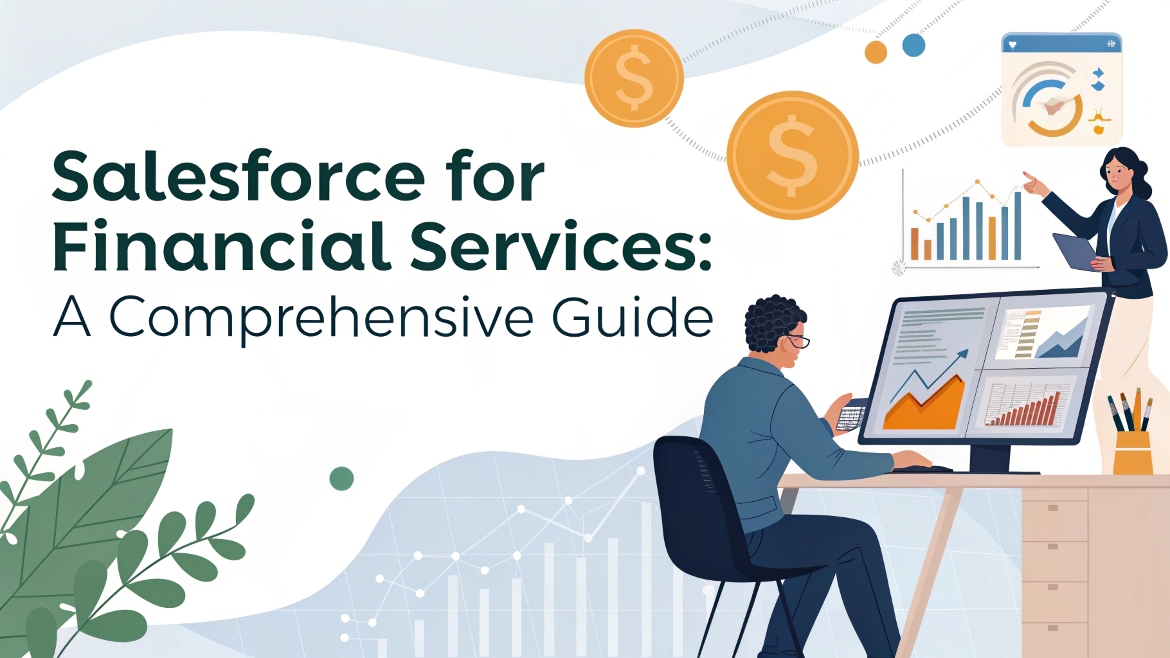Explore how Salesforce for Financial Services transforms customer relationships, streamlines operations, and enhances security. This comprehensive guide delves into Salesforce’s features, benefits, and how financial organizations can leverage it for success.
In today’s fast-paced financial world, customer expectations are at an all-time high, and institutions are under immense pressure to deliver personalized, seamless experiences. Enter Salesforce for Financial Services—a game-changer for financial organizations striving to manage relationships, optimize operations, and stay ahead of the competition.
Whether you’re a bank, insurance company, or wealth management firm, Salesforce offers a suite of tools designed specifically to address the unique needs of the financial services industry. But how can you truly harness the power of this platform? This guide will explore everything you need to know about Salesforce for Financial Services, from its key features to its transformative impact on business growth.
Introduction to Salesforce for Financial Services
Salesforce, the world’s leading CRM platform, has become a go-to solution for businesses across various industries. When it comes to financial services, Salesforce enables firms to effectively manage customer data, streamline workflows, and enhance collaboration. By providing a 360-degree view of each client, Salesforce empowers financial service providers to deliver more tailored solutions, anticipate client needs, and improve overall customer satisfaction.
With Salesforce’s powerful suite of tools, financial institutions can tackle challenges such as regulatory compliance, risk management, and data security while also offering personalized services to their clients. But what makes Salesforce particularly advantageous for financial services?
Key Features of Salesforce for Financial Services
Salesforce offers several specialized features for financial services companies. Let’s dive into some of the key tools and capabilities that make it such an effective platform for this sector:
1. 360-Degree Customer View
The foundation of Salesforce for Financial Services is the unified customer profile. By consolidating data across touchpoints—whether from digital interactions, service calls, or transactions—Salesforce gives financial institutions a complete view of their customers. This holistic approach allows companies to deliver more personalized services, anticipate client needs, and build stronger, longer-lasting relationships.
2. Salesforce Financial Services Cloud
Salesforce’s Financial Services Cloud is specifically designed to help financial institutions grow their businesses while remaining compliant with industry regulations. This cloud-based solution provides a robust platform to manage client relationships, track financial goals, and maintain regulatory compliance. With features like customized financial plans, relationship mapping, and data security, it empowers financial advisors and institutions to enhance service delivery and customer experience.
3. AI-Powered Insights with Einstein Analytics
Salesforce’s Einstein Analytics leverages AI and machine learning to provide actionable insights based on your data. In financial services, this can help identify trends, predict customer behavior, and optimize sales strategies. The result is improved decision-making and a more proactive approach to managing customer relationships.
4. Automation and Workflow Optimization
Manual processes can be time-consuming and prone to error. Salesforce helps automate many of the routine tasks that financial institutions face, from data entry to task management. Workflow automation minimizes human error, reduces operational costs, and allows financial services firms to focus more on high-value customer interactions.
5. Enhanced Collaboration Tools
Salesforce’s collaborative tools, such as Chatter and shared dashboards, enable seamless communication between team members across different departments. This enhanced collaboration ensures that everyone, from financial advisors to risk managers, has access to the most up-to-date information about clients and business processes, enabling better decision-making and more efficient service delivery.
6. Regulatory Compliance and Security
Financial services are heavily regulated, and staying compliant is a top priority. Salesforce provides built-in compliance tools that help financial institutions manage regulatory requirements, secure sensitive data, and reduce risk. Salesforce ensures that its cloud-based platform adheres to industry standards such as GDPR and FINRA, keeping financial firms safe from potential legal and reputational issues.
Benefits of Using Salesforce in Financial Services
Adopting Salesforce for Financial Services can offer significant advantages. Here are some of the core benefits:
1. Increased Efficiency and Productivity
By automating routine tasks and streamlining workflows, Salesforce helps financial services companies save time and resources. With less time spent on manual processes, teams can focus on more important tasks, like nurturing client relationships and strategizing growth.
2. Improved Client Relationships
The platform’s 360-degree view of the customer ensures that all client interactions are informed and personalized. Financial advisors can access a complete record of interactions, financial goals, and preferences, helping them provide more tailored advice and build trust with clients.
3. Scalability
Salesforce offers scalable solutions that can grow with your business. Whether you’re a small financial advisory firm or a large multinational bank, Salesforce’s customizable features allow you to scale the platform to meet your evolving needs.
4. Faster Decision-Making
With real-time data analytics and AI-driven insights, financial institutions can make faster, more informed decisions. This enables firms to react to market changes, client needs, and business opportunities with agility.
5. Enhanced Data Security
Security is paramount in the financial services industry. Salesforce employs robust security measures to ensure that sensitive financial data is protected, making it a reliable choice for institutions that must adhere to strict data privacy and security standards.
How to Leverage Salesforce for Your Financial Institution
To maximize the benefits of Salesforce, financial institutions must tailor the platform to meet their specific business needs. Start by defining clear objectives—whether it’s improving client retention, increasing operational efficiency, or managing compliance. Salesforce consultants can guide you through the process of customizing the platform and integrating it with your existing systems.
Additionally, training your team is crucial to unlocking Salesforce’s full potential. By empowering your employees to use Salesforce’s advanced tools and analytics, you can ensure a smoother transition and long-term success.
Conclusion
Salesforce for Financial Services is transforming how financial institutions manage customer relationships, streamline operations, and stay compliant with regulations. With its robust suite of tools, including the Financial Services Cloud, AI-powered insights, and workflow automation, Salesforce offers a comprehensive solution to the unique challenges of the financial services industry. By leveraging Salesforce’s capabilities, firms can enhance customer satisfaction, boost productivity, and drive sustainable business growth.
Whether you’re looking to improve efficiency, foster stronger client relationships, or ensure data security, Salesforce is the key to unlocking success in the financial services industry.
Explore More Articles:




Great guide – thank you for sharing.